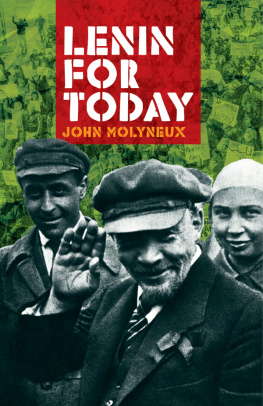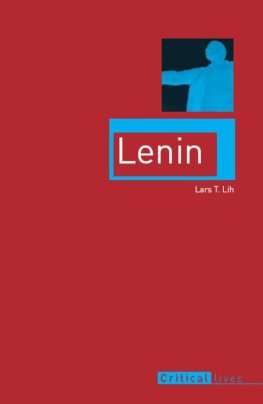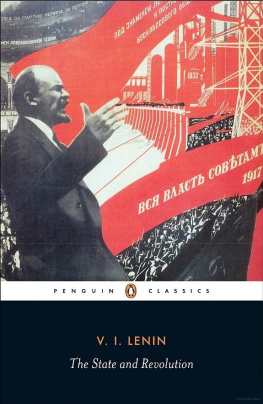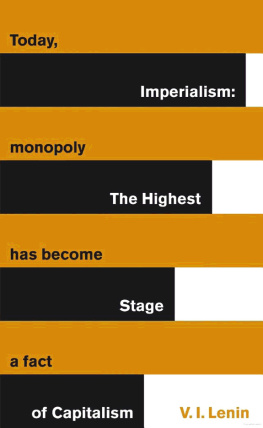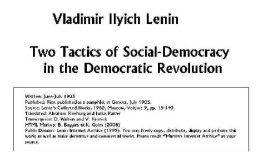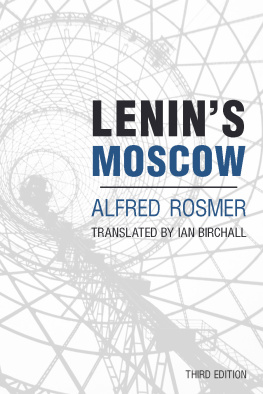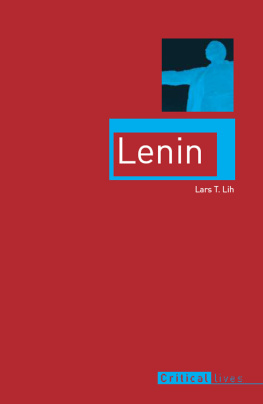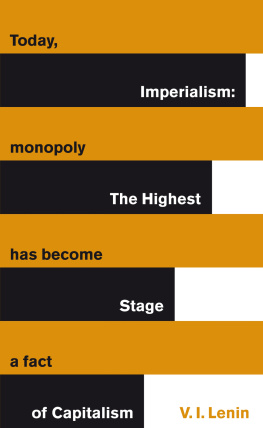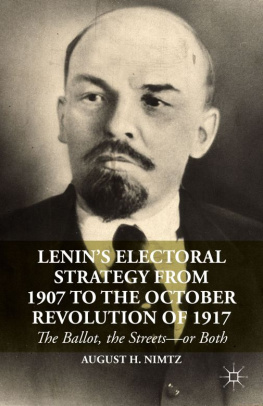LENIN FOR TODAY
John Molyneux
About the author
John Molyneux is a socialist writer and activist, formerly a lecturer a Portsmouth University and now living in Dublin. His publications include Marxism and the Party (1978), What is the Real Marxist Tradition? (1985), Rembrandt and Revolution (2001), Anarchism: A Marxist Criticism (2011) and The Point is to Change It: An Introduction to Marxist Philosophy (2012). He is a member of the Socialist Workers Party in Ireland and editor of the Irish Marxist Review.
Acknowledgements
The fundamental intellectual debt that requires acknowledgement is to Tony Cliff, author of State Capitalism in Russia and Lenin: a Political Biography, and founder of the International Socialist Tendency. Duncan Hallas and Chris Harman were also major influences.
I would like to thank Sally Campbell, Lina Nicolli, Martin Empson, Sameh Naguib and Huw Williams for reading the manuscript and for their many helpful comments, though naturally all responsibility for any errors of fact or judgement remain mine. I also thank Peter Robinson, Carol Williams, Ben Windsor and the Bookmarks team for their work in bringing the book to publication.
Lenin for Today
John Molyneux

Lenin for Today by John Molyneux
Published 2017
Bookmarks Publications
c/o 1 Bloomsbury Street, London WC1B 3QE
Designed and typeset by Peter Robinson
Cover design by Ben Windsor
Printed by Melita Press
ISBN 978-1-910885-61-1 (pbk)
978-1-910885-62-8 (Kindle)
978-1-910885-63-5 (ePub)
978-1-910885-64-2 (PDF)
Contents
Preface
WALKING with my partner through the streets of Athens in the summer of 2016 we saw a large piece of graffiti which read, Fuck May 68, Fight Now! Now May 68 meant a lot to me. My visit to Paris at the time of the student revolt and the workers general strike confirmed my decision to become a revolutionary socialist and Marxist and led directly to my joining the International Socialists a month or so later. Nevertheless, the spirit of the graffiti appealed to me and I hope that some of that spirit informs this book.
There is a vast literature on Lenin. Some of it, rather a lot, is in my view rubbish. Much of it is very useful. And there are, again in my view, two great books about him. These are Georg Lukcss Lenin: a Study on the Unity of his Thought, written in 1924 shortly after Lenins death, and Tony Cliffs four-volume political biography written in the 1970s. The Lukcs is a superb condensation of Lenins theoretical system demonstrating with great lan, as its title suggests, the dialectical unity of his thought, while justifying his claim that Lenin is the only theoretician equal to Marx yet produced by the struggle for the liberation of the proletariat. The Cliff study is a detailed examination of the entirety of Lenins political life (Cliff has minimal interest in the personal). It is less well written, much less artistically composed than the Lukcs but more thorough and much closer to Lenin as a practicing revolutionary and leader of a revolutionary party, doubtless because that is what Cliff was when he wrote it.
So why add to this body of work? I am not going to outdo Lukcs in his command of the dialectic or his theoretical brilliance, nor will I match Cliffs scope, detail and intense understanding of the historical context and Lenins response to it. In truth I am also not going to match the likes of Lars Lih in his formidable scholarship. Nor am I proposing any radically new interpretation of Lenin. Broadly, with differences here and there, I accept the interpretation made by Lukcs in 1924 (as opposed to his 1967 Postscript), by Trotsky in his historical defence of Leninism against Stalinism, by Cliff in the studies mentioned above, and by Paul Le Blanc in his Lenin and the Revolutionary Party.
I reject, root and branch, the interpretation developed during the Cold War by establishment academics which became what Lars Lih calls the textbook interpretation. I also reject the Stalinist hagio-graphical version of Lenin as an omniscient and infallible born leaderthis will be less apparent here because this version has very much faded from the scene. (The interested reader will find plenty of corrections to it in the Cliff study). I welcome Lars Lihs meticulous dismantling of the textbook view in Lenin Rediscovered. However, I think he underestimates the way in which Lenins position on the party developed and changed through experience and in response to changing circumstances and I disagree strongly with Lihs tendency to play down the difference between Lenin and Kautsky, between Bolshevism and German Social Democracy.
Rather, what this book tries to offer is an argument: a sustained case for the relevance of Lenins main political principles for the world today. I should explain what I do and do not mean by this. Lukcs, in his 1967 Postscript to his Lenin, refers to the twenties as a past periodwhich is now entirely closed, This is not my intention. I am well aware and much in awe of Lenins unique personal characteristics, but I am arguing for something much more mundane and also more important: namely, that the core of his politics, the central ideas articulated in his main works and in his political practice as a Bolshevik and in the Communist Internationalcommitment to working class revolution, total opposition to imperialism, the need to destroy the capitalist state, the necessity of a revolutionary party and the need to fight all forms of oppressionremain central to socialist practice today. This is why the book begins with an argument about the present state of the worldwhy we need a revolution and why that revolution will be a workers revolutionrather than with Lenin in 1893 or in 1917 for that matter.
Of course this is an argument that runs against the streamnot just the mainstream of bourgeois politics, the capitalist media and the academic consensus, but also against the predominant stream on the left. The current zeitgeist on the left is many different versions of left reformism ranging from Syriza in 2015, which generated immense enthusiasm on the European left, to Podemos, the Corbyn phenomenon and Sanderss political revolution which, of course, was only ever a metaphorical revolution. These various movements are all very positive developments and deserving of support against the right but whether or not they can winthat is, not just win an election but also significantly transform societyis a different matter. If they can and do, then the case made here will clearly prove mistaken and irrelevant. But, unfortunately, I believe this is extremely unlikely for reasons spelt out in detail in this book and that therefore it is necessary, while working with and supporting these progressive movements, to prepare on a different, more revolutionary basis.
Again it is necessary to stress, and I shall return to this point later, this does not mean any attempt to mechanically copy Lenin or reproduce the specific organisational form of the Bolshevik Party. Times have changed and circumstances are different and mechanical repetition, which anyway would be quite contrary to the spirit of Lenin, would produce only parodywhat Tony Cliff used to call toy bolshevism. Moreover, to be a Marxist and a revolutionary today involves addressing a multitude of issues that arose after Lenins death and about which he said little or nothing. I discuss this in the final chapter. But, in my view, this does not change the fact that there were a number of absolutely crucial questions about which Lenin was right a hundred years ago and remains right today, in the sense that Marx was right about the accumulation of capital in 1867 and Darwin was right about evolution in 1859 and they remain right today.
Next page
